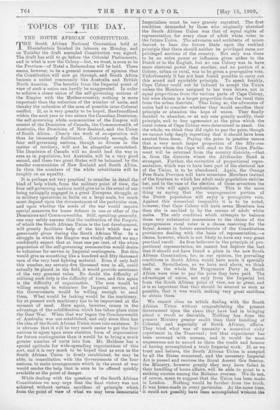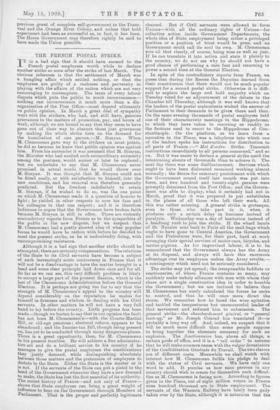TOPICS OF THE DAY • THE SOUTH AFRICAN CONSTITUTION. T HE
South African National Convention held at Bloemfontein finished its labours on Monday, and on Tuesday the draft amended Constitution was signed. The draft has still to go before the Colonial Parliaments, and in what is now the Colony—but, we trust, is soon to be the Province—of Natal a Referendum will be held. There seems, however, to be a general consensus of opinion that the Constitution will now go through, and South Africa become a united community like Australia and British North America. The benefits from the Imperial point of view of such a union can hardly be exaggerated. In order to achieve a closer union of the self-governing nations of the Empire with the Mother-country, nothing is more important than the reduction of the number of units, and thereby the reduction of the area of possible inter-Colonial conflict. If, as is very greatly to be hoped, Newfoundland within the next year or two enters the Canadian Dominion, the self-governing white communities of the Empire will consist of the Dominion of Canada, the Commonwealth of Australia, the Dominion of New Zealand, and the Union of South Africa. Clearly the work of co-operation will thus be immensely facilitated. Curiously enough, the four self-governing nations, though so diverse in the matter of territory, will not be altogether unmatched. The Dominion of Canada will no doubt lead the way in area as in population, but Australia will be a very good second, and these two great States will be balanced by the smaller communities of New Zealand and South Africa. In them the numbers of the white inhabitants will be roughly on an equality.
It is perhaps not very practical to consider in detail the kind of help which, from the military point of view, the four self-governing nations could give ue in the event of our being unhappily engaged in a great European struggle, or in military operations in India on a large scale, for much must depend upon the circumstances of the particular case, and upon whether the needs of the war would require special measures for home defence in one or other of the Dominions and Commonwealths. Still, speaking generally, one may safely assume that the unification of the Empire, of which the South African Union is the last development, will greatly facilitate help of the kind which was so generously given during the South African War. In a struggle in which the Empire was vitally affected we may confidently expect that at least one per cont, of the white population of the self-governing communities would desire to volunteer for' service in Imperial contingents. But this would give us something like a hundred and fifty thousand men of the very best fighting material. Even if only half this number, say seventy-five thousand men in all, could actually be placed in the field, it would provide assistance of the very. greatest value. No doubt the difficulty of utilising such help is the difficulty of time, and this again is the difficulty of organisation. The men would be willing enough to volunteer for Imperial service, and the Governments would be willing enough to send them. What would be lacking would be the machinery, for at present such machinery has to be improvised at the moment of need. Here again, however, comes in the advantage of the solidification which has taken place since the Boer War. When that war began the Commonwealth of Australia was not established, and only since then has the idea of the South African Union come iuto existence. It is obvious that it will be very much easier to got the four nations to agree upon some skeleton form of organisation for future contingencies than it would be to bring a much greater number of units into line. Mr. Haldane has a special aptitude for wide-spreading organisations of this sort, and it is very much to be hoped that as soon as the South African Union is firmly established, he may be able, in consultation with the Governments of the four nations, to make arrangements which in the event of war would render the help that is sure to be offered quickly available at the point of danger.
While dealing with the question of the South African Constitution we may urge that the final victory was not achieved without certain sacrifices of principle which from the point of view of what we may term democratic Imperialism must be very gravely regretted. The first condition demanded by those who originally sketched the South African Union was that of equal rights of representation for every class of adult white voter in the future Union. The advocates and architects of union desired to base the future State upon the rockbed principle that there should neither be privileged races nor privileged sections of the country. Not only was there to be no extra power or influence given either to the Dutch or to the English, but no one Colony was to have more electoral power than another, and no portion of a Colony, urban or rural, was to be given a prerogative vote. Unfortunately it has not been found possible to carry out this sound and equitable principle. To speak frankly, Cape Colony could not be induced to accept the Union unless the Members assigned to her were drawn, not in equal proportions from the various parts of Cape Colony, but were chosen in a larger proportion from the rural than from the urban districts. That being so, the advocates of . union bad to consider whether they would sacrifice their principle or abandon the hope of union. They finally decided to abandon, or at any rate greatly modify, their principle, and to buy agreement at the price which the rural voters of Cape Colony were determined to exact. On the whole, we think they did right to pay the price, though we cannot help deeply regretting that it should have been exacted from them. Paying the price in practice meaus that a very much larger proportion of the fifty-one Members whom the Cape will send to the Union Parlia- ment will be returned from the country districts,—that is, from the districts where the Afrikander Bond is strongest. Further, the corrective of proportional repre- . sentation, which was to have been part of the electoral law of the Union, is to be abandoned. Again, the Orange Free State Province will have seventeen Members instead of the fourteen to which her adult male population entitles her, and in the case of the election of these seventeen the rural vote will again predominate. This is the same thing as saying that the unprogressive portion. of the Dutch population will enjoy a prerogative vote. Against this numerical inequality it is to be noted, however, that Cape Colony will have seven Members less than she is entitled to by the census of adult white males. The only condition which attempts to balance these very substantial concessions to the claims of the unprogressive rural voter is a clause reserving for the Royal Assent in future amendments of the Constitution provisions dealing with the basis of representation,.—a clause, however, which is not likely to have any very groat practical result. As firm believers in the principle of pro- portional representation, we cannot but deplore the fact that it should not have found a place in the new South African Constitution, for, in our opinion, the prevailing conditions in South Africa would have made, it specially useful. Nevertheless, as we have said above, we think that on the whole the Progressive Party in South Africa were wise to pay the price they have paid. The advantages of union, not only from the Imperial but from the South African point of view, are so groat, and it is so important that they should be secured as soon as possible, that it was worth making very great sacrifices to obtain. them.
We cannot close an article dealing with the South African Union without congratulating the present Government upon the share they have had in bringing about a result so desirable. Nothing has done the present Ministry greater credit than their handling of Colonial, and especially of South African, affairs. They tried what was of necessity a somewhat risky experiment in the Transvaal; but that experiment has been crowned with success, and it would be most ungenerous not to accord to them the credit and honour of having accomplished a truly Imperial work. If, as we trust and believe, the South African Union is accepted by all the States concerned, and the necessary Imperial Act is passed and receives the Royal Assent this Session, the Ministry, however greatly they may have failed in their handling of home affairs, will be able to point to a striking success among the Britains oversea, We do not, of course, mean to suggest that the Union has been made in London. Nothing would be further from the truth. It was home-made in every particular. At the same time, it could not possibly have been accomplished without the previous grant of complete self-government to the Trans- vaal and the Orange River Colony, and unless that bold experiment had been as successful as, in fact, it has been. The Home Government may therefore rightly be said to have made the Union possible.











































 Previous page
Previous page